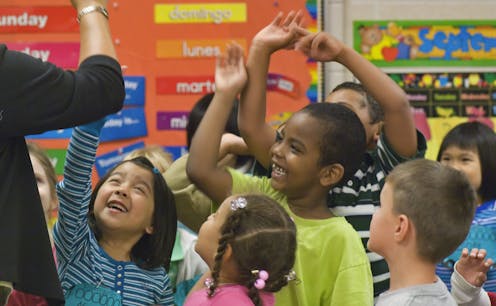Why do kids have to go to school?
- Written by Hawani Negussie, Chair and Assistant Professor of Early Childhood Education, UMass Global, University of Massachusetts

Middle school
During the middle school years, when students are typically between 10 and 13 years old, kids and parents are both starting to interact with school in different ways. Teachers increasingly give more responsibilities to students, and they try their best to personalize what happens in the classroom to students’ talents and strengths.
As students become increasingly independent, parents often pass on more school-related responsibilities to them. Students feel capable and competent when their environment supports who they are[16] and encourages them to apply their existing skills at all levels, but especially in middle school.
Understanding all of the challenges kids are going through – like fitting in, maintaining friendships, puberty and others – can be overwhelming. But middle school also offers opportunities for students to sharpen their skills and talents. Some schools may offer band, theater or robotics and other new opportunities to learn, play and grow alongside their daily studies.
High school
High school is an exciting time for most students because it’s the final gateway to adulthood. Students may take on a heavier academic and extracurricular load as a way to prepare for higher education[18]. In high school, students are able to choose from a range of courses that may include journalism, biology, an advanced foreign language class or world history. At the same time, students may begin taking part in specialized activities like volunteering or trips abroad that could expose them to fields they’d like to study if they choose to continue to college.
The core principle of education is to enable students to become kind, giving and contributing members[19] of their community and the world. While not all students have the opportunity to attend great schools because of unequal circumstances, it is critical all children are afforded education, at home or at school, public or private. Schools are a tried-and-true place where kids gain new skills and knowledge that they continue to use and build on for the rest of their lives.
Hello, curious kids! Do you have a question you’d like an expert to answer? Ask an adult to send your question to CuriousKidsUS@theconversation.com[20]. Please tell us your name, age and the city where you live.
And since curiosity has no age limit – adults, let us know what you’re wondering, too. We won’t be able to answer every question, but we will do our best.
References
- ^ Curious Kids (theconversation.com)
- ^ curiouskidsus@theconversation.com (theconversation.com)
- ^ them gain new ones (doi.org)
- ^ studying and working with children (www.umassglobal.edu)
- ^ 61% of 3-to-5-year-olds (nces.ed.gov)
- ^ critical years for brain development (www.edutopia.org)
- ^ high-quality learning program (learningpolicyinstitute.org)
- ^ play to be the focus of most activities (doi.org)
- ^ respond to each child’s needs (www.cde.ca.gov)
- ^ sense of self (illinoisearlylearning.org)
- ^ practice sharing (www.naeyc.org)
- ^ for this new experience (doi.org)
- ^ kids learn from the day they are born (www.cdc.gov)
- ^ understand more complex thought processes (www.simplypsychology.org)
- ^ Maskot/Maskot via GettyImages (www.gettyimages.com)
- ^ their environment supports who they are (www.ascd.org)
- ^ Willie B. Thomas/DigitalVision via Getty Images (www.gettyimages.com)
- ^ prepare for higher education (ies.ed.gov)
- ^ kind, giving and contributing members (www.pbs.org)
- ^ CuriousKidsUS@theconversation.com (theconversation.com)
Authors: Hawani Negussie, Chair and Assistant Professor of Early Childhood Education, UMass Global, University of Massachusetts
Read more https://theconversation.com/why-do-kids-have-to-go-to-school-184612

